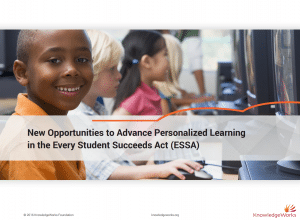ESSA Represents an Historic Opportunity to Advance Personalized Learning
CompetencyWorks Blog
 I have great news. After fifteen years of operating under No Child Left Behind (NCLB), we finally have the chance to say goodbye to one-size-fits-all assessments, accountability systems that mask achievement gaps, and autopsy-style school improvement strategies. While there were some good things about NCLB, the law also created a long list of policy barriers that made it impossible to build and scale personalized learning environments. The newly-enacted Every Student Succeeds Act (ESSA), on the other hand, eliminates almost every one of those barriers, gifting the personalized learning community with an historic opportunity to transform the education system.
I have great news. After fifteen years of operating under No Child Left Behind (NCLB), we finally have the chance to say goodbye to one-size-fits-all assessments, accountability systems that mask achievement gaps, and autopsy-style school improvement strategies. While there were some good things about NCLB, the law also created a long list of policy barriers that made it impossible to build and scale personalized learning environments. The newly-enacted Every Student Succeeds Act (ESSA), on the other hand, eliminates almost every one of those barriers, gifting the personalized learning community with an historic opportunity to transform the education system.
While enactment of ESSA marks an exciting turn of events, we cannot celebrate until we do the hard work of helping states identify and leverage these opportunities. To this end, KnowledgeWorks recently released a side-by-side tool entitled New Opportunities to Advance Personalized Learning in the Every Student Succeeds Act (ESSA). This tool provides a brief overview of each opportunity in the law along with a description of how it compares to policies in NCLB and the Obama Administration’s NLCB waiver package. Our hope is that states knit together these opportunities into a comprehensive and compelling vision for teaching and learning that meets students where they are and provides them with customized supports to ensure their success.
Here is a quick overview of KnowledgeWorks’ top ten opportunities in ESSA to advance personalized learning.
- Assessment – States have an opportunity to replace or enhance current assessments with those that measure complex demonstrations of mastery, integrate multiple points of learning evidence, and provide an accurate picture of each student’s learning trajectory so stakeholders can respond with customized supports and interventions.
- Innovative Assessment Pilot – A new demonstration program will provide interested states with a unique opportunity to pilot high-quality, rigorous assessments that validate mastery of academic knowledge and core competencies through more complex performance-based tasks.
- Accountability – States may integrate personalized learning indicators into their accountability system and assign substantial weight to those measures to ensure all students master the knowledge, skills, and competencies to succeed in college and career.
- School Improvement – States have the flexibility to build a robust system of supports and interventions that incorporates personalized learning strategies to ensure all students are able to reach mastery by graduation.
- Direct Student Services – States have the opportunity to reserve up to 3 percent of their Title I, Part A grant to provide direct student services including high quality personalized learning opportunities.
- Educator Quality – By eliminating the highly qualified teacher requirement, ESSA gives states an opportunity to design a new strategy for educator quality that aligns to a vision for personalized learning.
- Leader Quality – States may take advantage of the opportunity to reserve up to 3 percent of their Title II, Part A grant to build a workforce of principals and other school leaders with the skills to help schools transition to personalized learning environments.
- Title IV, Part A Student Support and Academic Enrichment Grants – ESSA creates a new block grant that states can leverage to encourage innovation and personalized learning activities across the state.
- 21st Century Community Learning Centers – States can leverage federal resources to support partnerships with community organizations in the provision of personalized learning opportunities outside of the traditional school day, including those that provide students with academic credit.
- Community Support for School Success – Thanks to the authorization of the full-service community schools and promise neighborhoods programs, ESSA provides a significant opportunity to leverage community partners to help implement evidence-based personalized learning strategies to improve outcomes for students across the cradle to career continuum.
Lillian Pace is the Senior Director of National Policy at Knowledgeworks.